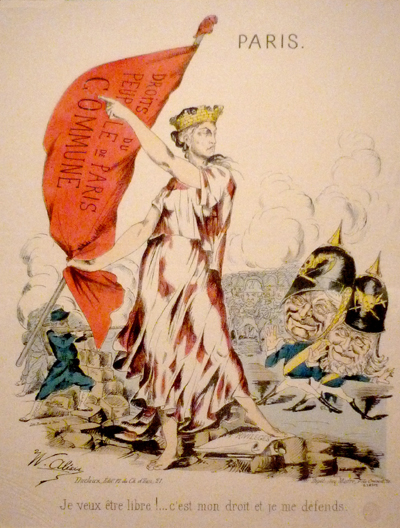A fictional account of the Commune's break with the national government from Emile Zola's novel La débâcle [ The Downfall ] (1892)
The already tense relations between the Paris Commune and the national government boiled over when troops loyal to the latter tried to seize a number of cannons controled by the Commune. This was prevented by national guard units loyal to the Commune, and there was a great outcry against the goverrnment, which was forced to retreat to Versailles, a few miles outside of Paris. |
Ah, that day of the 18th of March, the elation and enthusiasm that it aroused in Maurice! In after days he could never remember clearly what he said and did. First he beheld himself
Communard Poster Caption reads: "I want to be free! . . . It is my right and I am defending myself." |
dimly, as through a veil of mist, convulsed with rage at the recital of how the troops had attempted, in the darkness and quiet that precedes the dawn, to disarm Paris by seizing the guns on Montmartre heights. It was evident that Thiers, who had arrived from Bordeaux, had been meditating the blow for the last two days, in order that the Assembly at Versailles might proceed without fear to proclaim the monarchy. Then the scene shifted, and he was on the ground at Montmartre itself--about nine o'clock it was--fired by the narrative of the people's victory: how the soldiery had come sneaking up in the darkness, how the delay in bringing up the teams had given the National Guards an opportunity to fly to arms, the troops, having no heart to fire on women and children, reversing their muskets and fraternizing with the people. Then he had wandered desultorily about the city, wherever chance directed his footsteps, and by midday had satisfied himself that the Commune was master of Paris, without even the necessity of striking a blow, for Thiers and the ministers had decamped from their quarters in the Ministry of Foreign Affairs, the entire government was flying in disorder to Versailles, the thirty thousand troops had been hastily conducted from the city, leaving more than five thousand deserters from their numbers along the line of their retreat. And later, about half-past five in the afternoon, he could recall being at a corner of the exterior boulevard in the midst of a mob of howling lunatics, listening without the slightest evidence of disapproval to the abominable story of the murder of Generals Lecomte and Clement Thomas. Generals, they called themselves; fine generals, they! The leaders they had had at Sedan rose before his memory, voluptuaries and imbeciles; one more, one less, what odds did it make! And the remainder of the day passed in the same state of half-crazed excitement, which served to distort everything to his vision; it was an insurrection that the very stones of the streets seemed to have favored, spreading, swelling, finally becoming master of all at a stroke in the unforeseen fatality of its triumph, and at ten o'clock in the evening delivering the Hotel de Ville over to the members of the Central Committee, who were greatly surprised to find themselves there. . . .
The extraordinary occurrences of the next and the succeeding days crowded on the heels of one another in such swift sequence that Maurice had scarcely time to think. On the morning of the 19th Paris awoke without a government, more surprised than frightened to learn that a panic during the night had sent army, ministers, and all the public service scurrying away to Versailles, and as the weather happened to be fine on that magnificent March Sunday, Paris stepped unconcernedly down into the streets to have a look at the barricades. A great white poster, bearing the signature of the Central Committee and convoking the people for the communal elections, attracted attention by the moderation of its language, although much surprise was expressed at seeing it signed by names so utterly unknown. There can be no doubt that at this incipient stage of the Commune Paris, in the bitter memory of what it had endured, in the suspicions by which it was haunted, and in its unslaked thirst for further fighting, was against Versailles. It was a condition of absolute anarchy, moreover, the conflict for the moment being between the mayors and the Central Committee, the former fruitlessly attempting to introduce measures of conciliation, while the latter, uncertain as yet to what extent it could rely on the federated National Guard, continued modestly to lay claim to no higher title than that of defender of the municipal liberties. The shots fired against the pacific demonstration in the Place Vendome, the few corpses whose blood reddened the pavements, first sent a thrill of terror circulating through the city. And while these things were going on, while the insurgents were taking definite possession of the ministries and all the public buildings, the agitation, rage and alarm prevailing at Versailles were extreme, the government there hastening to get together sufficient troops to repel the attack which they felt sure they should not have to wait for long. The steadiest and most reliable divisions of the armies of the North and of the Loire were hurried forward. Ten days sufficed to collect a force of nearly eighty thousand men, and the tide of returning confidence set in so strongly that on the 2d of April two divisions opened hostilities by taking from the federates Puteaux and Courbevoie.
